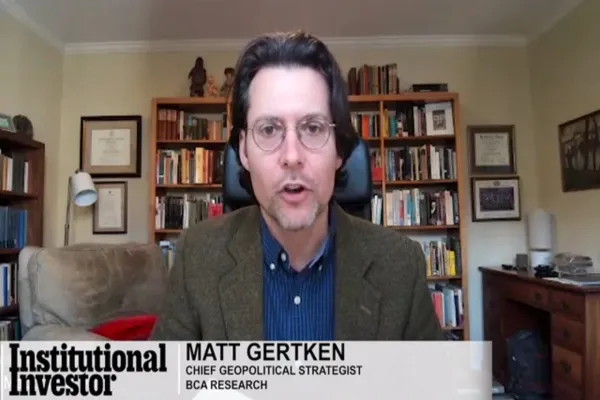The international junket jet set is said to be a bunch of billionaires telling audiences of millionaires how the middle class lives. Yet on January 18 in Davos, Switzerland, a man unlikely to be worth much money at all made the case for millionaires and billionaires to support a revolutionary system of financial redistribution.
The man was Guy Standing, a professorial research associate at the University of London and a longtime advocate of universal basic income. He was, of course, attending the World Economic Forum Annual Meeting, the uber-conference of the G-6 crowd. Seated on a low stage set for a panel discussion on UBI moderated by the business editor of the Economist, Standing overwhelmed his three fellow esteemed panelists with the sheer volume of his words.
He is perhaps the world’s most outspoken proponent of a system that would provide a base level of income for all, regardless of whether or not they work. He co-founded the Basic Income Earth Network in 1986, a group that promotes the idea, and has advised various governments on its implementation. If Standing’s chest was particularly puffed at Davos, it was because his life’s work, “a very old and, I think, an extremely radical idea, has come to the fore,” according to the moderator, who cited Ontario, Finland, and various Scottish and Dutch cities as locales testing the concept. (Switzerland recently held a vote on starting such a scheme; it was overwhelmingly defeated, 77 percent to 23 percent.)
“In the last couple of years, there’s suddenly been a huge surge of interest, partly by a realization about automation,” Standing replied. “I want to stress that’s not my rationale for a basic income — it never has been — but it’s quite useful because it’s made us much more topical.” Instead, Standing’s contention is that public wealth is created over generations and thus should be shared across generations (a variation on the “you didn’t build that” argument from Senator Elizabeth Warren and former president Barack Obama). Plus, he abhors rentier capitalism, a neo-Marxist term for the parasitic monopolization of resources without benefit to the public.
The professor then piqued the interest of any asset managers in Davos. “Something like the Alaska Permanent Fund or the Norwegian fund — had Britain set up the same fund, they could be paying out more than the basic income now,” he proposed. “So what we are arguing [is to] build up a sovereign wealth fund system by levying it on rental income, intellectual property, and so on, and couch the debate as redistributing income as a system and not taxing the worker to pay a lazy system.”
As any hedge fund manager knows, Alaska Permanent and Norges Bank Investment Management (the Norwegian fund Standing was referencing) invest huge amounts of capital with alternatives managers. You would be hard-pressed to find a Connecticut or London money management baron who disagrees with the idea of more sovereign wealth funds. So why haven’t more financial titans raced to support Standing’s position?
Taxes, for one. Any redistribution system guaranteeing basic income for all citizens will surely raise taxes on the rich, including money managers.
Not so fast, says Charles Murray, a libertarian scholar at the American Enterprise Institute. According to Murray, scrapping the current American system of welfare and replacing it with an annual payment of $10,000 to every adult would actually save money over the long run. Part of this would stem from the dismantling of Social Security — which invests solely in Treasuries — and forcing individuals to plan on their own for retirement, most likely using the asset management and insurance industries.
Further proof that the money management industry might benefit from such redistribution can be found in the Bureau of Labor Statistics’ Consumer Expenditure Survey. All else being equal, if Murray’s plan ever reaches fruition (and even he admits it would likely require a Constitutional amendment prohibiting non–basic income social programs), adding $10,000 to every adult’s income each year would likely increase the amounts directed to invested retirement and insurance general accounts. As the annual survey shows, a household of two adults making $24,000 currently spends 2 percent of income on retirement accounts, 3.1 percent on insurance, and 2 percent on Social Security and pensions. If they were given the additional capital and if their behavior remained consistent with their new cohort (a big if), these figures would rise to 5.1, 5.6, and 5.1 percent — a total of 15.8 percent, doubling the assets potentially flowing into the pockets of mutual funds, target date funds, and ETFs.
The impact of such a monumental transformation of the welfare state as proposed by Standing and Murray — two men at opposite ends of the political spectrum — would, of course, cause entirely unpredictable outcomes. Taxes at the top end could rise (although Murray doesn’t think so); individual investment risk appetite could change dramatically (but logic suggests it would increase, given the overt safety net); retirement savings might become less of a focus, given the guaranteed income in place for life (yet the $10,000 that Murray proposes would be an uncomfortable retirement).
But even with these large grains of salt, it is not hard to believe that the asset management industry — and the many wealthy people working within it — might benefit from such a system. Capital may flow to the alternative-investment billionaires who work with the likes of Alaska Permanent, Norges Bank, or whatever new sovereign funds would emerge out of the reforms. It may flow to the lower-cost, retail investment millionaires at more traditional long-only shops. But unless there’s been a serious miscalculation by men such as Murray and Standing, the money will flow somewhere. Perhaps, then, a panel suggestion for the 2018 Davos agenda: The Case for Hedge Fund Marxism.






